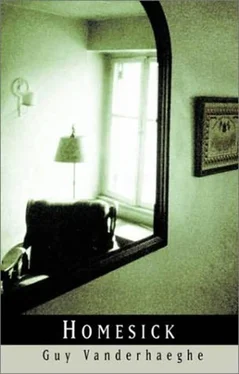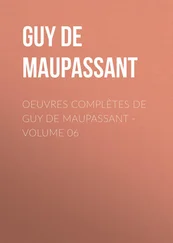No reply. And there was something in the manner his grandfather held himself, a stubborn, secretive dignity, which rooted Daniel just inside the doorway, which prevented him as surely as a hand thrust in his chest from taking one more step into the living room and trespassing. He was convinced his grandfather had heard him, knew he was there. The awkwardness of the situation kept him nervously talking.
“I suppose you’re pissed off at me about last Saturday. Okay, I get the message then – I know you’re pissed off. I’m sorry. But I’ve been pissed off at you, too, lots of times – about baseball, about all kinds of things. But that didn’t mean I wouldn’t talk to you. So what do you say? You going to talk to me?”
His grandfather stood leaning on the back of the kitchen chair, monumental in his silence. A doubt crossed Daniel’s mind. What’s wrong with this picture? Something was. The doubt carried him two steps further into the room. “Alec, what’s the matter?” he asked. His voice was louder than he had intended.
The bowed shoulders heaved, the chair scraped and shifted on the floor. His grandfather used the chair to support himself as he fought to turn around; it was his prop, a four-legged crutch which he savagely jerked and shoved so that its abrupt, violent hopping on the floor made it seem alive, something struggling to tear itself free from his grip. Between the sudden, desperate leaps of the chair on the floor the old man adjusted his balance, scuffling his feet into a new position while the chair that kept him upright trembled and quivered under the burden of his weight, threatening to tip. A brief pause, the room swelling with the rasp of his laboured breathing, and then once again the dull, heavy load of flesh tried to turn itself to the boy. The chair rocked, its feet scratched, it gave a startled jump. A few inches closer. And with each painful step, with each convulsion, the understanding grew in Daniel that something terrible was striving to show itself to him.
At last he was face to face with it and only wanted to look away. His grandfather was not right. One side of his face had melted and run like hot wax, the muscles were all loose and hanging. His mouth sagged open and his left eyelid drooped, obscuring half the staring blue of the pupil.
“What happened?” Daniel whispered. “Why are you like this?”
The old man’s right hand rose slowly from where it rested on the back of the chair. Up, up it came and laid a forefinger like a bar across the slack lips and fallen mouth. The child’s sign for secrecy. He tried to shush but the sound he made bubbled instead, loose, sloppy, full of spit.
“Oh God, oh God,” Daniel muttered, stepping from foot to foot in his apprehension. “Oh God, oh God. Somebody. Please.”
A word was floundering in his grandfather’s mouth. His tongue could be glimpsed fluttering rapidly between the barricade of false teeth. “Fro’en!” he blurted suddenly.
“I don’t understand. I don’t understand what you’re trying to tell me. I don’t know what to do for you. Tell me what to do,” whispered Daniel, hopping lightly from foot to foot like a small boy needing a pee.
“Fro’en!” cried the old man, banging the chair on the floor, shaking it, shaking his head violently from side to side. “Fro’en! Fro’en! Fro’en!”
Daniel started to cry. “Don’t you see?” he asked. “I can’t understand you. I can’t understand you, Alec. Don’t you see?”
Maybe he did. The rage died. The old man stood staring and panting. Then once more his right hand lifted to his face; awkwardly he stabbed three of his fingers into the cheekbone beneath the partially veiled eye and drew them deliberately and brutally down to his jaw. The white pressure marks showed on his skin like frost.
“Fro’en,” he said, speaking softly now but with urgency. “Fro’en.”
At last Daniel understood. His grandfather was telling him he was frozen.
Panicked by the emergency, Daniel turned to his mother, spilling into the telephone the story of how he had discovered the old man clinging to a chair back for dear life. “He’s sick or something,” he kept repeating. “Real sick.”
“All right, Daniel,” said Vera calmly, once she had judged the seriousness of the situation. “I want you to stay there with him. Don’t leave him and see that he doesn’t fall. Don’t try and move him yourself, he’s too heavy for you. Just wait. Someone will be there right away. It won’t be long. Just stay calm and collected. I know you can. I know you can be brave for me. Will you do that for me, dear?”
Daniel promised he would.
Vera made a quick decision not to call for the ambulance. It was stationed at the mine site twenty-four hours a day in readiness for serious accidents and in the time it would take the ambulance to cover the distance to town, Stutz could be at her father’s with minutes to spare. When she rang Stutz at the garage she was cool and terse. “Listen, Daniel just called to say something has happened to Dad at the house. The kid says he’s sick and he’s plenty upset so I think he must be. You better get over there, fast. By the sounds of it he probably needs the hospital.”
Mr. Stutz burst into the house and upon Monkman swaying behind a chair in the living room, his face scarcely recognizable. Daniel stood beside him, his grandfather’s sleeve knotted in his fist to help anchor him. When the boy saw Stutz he began to clumsily pat the old man on the back. “Here’s Mr. Stutz,” he said encouragingly. “You’re okay now. Mr. Stutz is here.”
Mr. Stutz came very close and peered into Monkman’s collapsed face with disconcerting directness. Then he took a step backward and asked, “What’s the trouble, Alec?”
Daniel hastened to answer for his grandfather. “He can’t talk very well. He’s hard to understand.”
Stutz nodded, absorbing this news. “All right then,” he said, addressing Daniel, “we better see he gets to the hospital.” He turned to Monkman and spoke very slowly and deliberately. “Not to worry. We’re going to see Doctor now.”
He hadn’t expected to prompt a rebellion. Shaking his head vehemently no, Monkman tightened his grip on the chair. Mr. Stutz was a practical man not given to hopeless coaxing and cajoling. After several attempts at persuasion failed, he simply pried Monkman’s fingers one by one from the chair back. Daniel supported the unsteady old man from behind while he did this, his arms wrapped around his waist. Then as Monkman frantically pawed and dog-paddled the air, straining to reattach himself to the chair, Stutz kicked it out of his reach and slung one of the old man’s arms over his shoulder. “Now,” he said grimly to Daniel, “if you take his other arm maybe we can get this show on the road.”
They half-led, half-carried the old man to the truck, and as they did Daniel lapsed into tears again, tears which Mr. Stutz discreetly overlooked and allowed to pass unremarked. Daniel was crying again because this felt like a second act of treachery, helping to compel Alec to go to the hospital against his wishes. It didn’t matter that Daniel recognized the necessity of what they were doing; what they were doing seemed to be adding to the old man’s suffering. He moaned and twisted fitfully in their grip, flapping his hands and slurring protests. It upset Daniel dreadfully when Stutz made him hold his grandfather back against the seat as they drove to St. Anthony’s Hospital and the old man struck feebly at him with his hands. But all of this was nothing beside the moment before the door to his grandfather’s room was swung shut and Daniel saw him sitting blank-faced and defeated on the edge of his bed while a chattering nurse eased him out of his shirt. At that moment a wilderness of loneliness opened up before the boy.
Читать дальше












